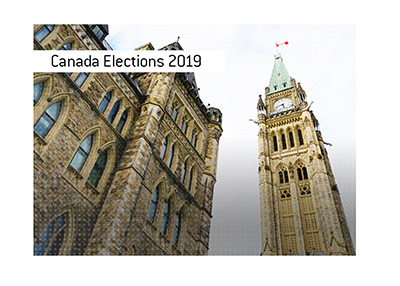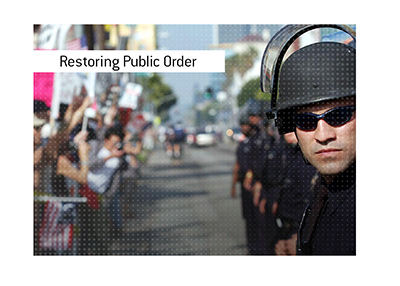Prime Minister Trudeau Seen as Slight Favourite To Win Election
 On October 21st, 2019, Canadians will take to the polls to vote in their federal election.
On October 21st, 2019, Canadians will take to the polls to vote in their federal election. 338 seats in the House of Commons are up for grabs, and the parties will need 170 seats in order to form a majority government. Canada currently has a majority Liberal government, as they swept to victory in 2015, grabbing a total of 184 seats.
The story of the 2015 election was the surge in popularity of Justin Trudeau, who managed to push out the long-time Conservative Prime Minister, Stephen Harper. Trudeau promised more optimism, more hope and more spending. Fiscal prudence was to take a back seat to increased spending - in fact, the pivotal moment of Trudeau's campaign was when he abandoned a pledge to balance the budget, instead poaching voters on the left by promising increased federal spending (and deficits).
Trudeau has had a number of gaffes and scandals during his four years as Prime Minister, including the SNC-Lavelin affair and the "black and brownface" scandals. With all that being said, Trudeau is still currently the betting favourite to retain his post as Prime Minister, though he will possibly have to do it with a minority government.
Detractors of Trudeau say that he is inexperience, bumbling and not respected on the world stage. Trudeau supporters say that he has maintained a strong economy in the face of global weakness and that he is the perfect leader to combat climate change.
Trudeau's biggest opposition is Andrew Scheer of the Conservative Party. Scheer is a social conservative that is quite popular in the prairie provinces (Alberta, Saskatchewan and Manitoba). Scheer has been hammering away at Trudeau on the campaign trail, calling the current Prime Minister corrupt and inept. Trudeau, on the other hand, has gone out of his way to tie Scheer to Doug Ford (current premier of Ontario) and even President Donald Trump.
There is no doubt that the Conservatives will build on their 2015 results - the question is, can they turn enough seats to propel Scheer to Prime Minister?
The NDP party continues to flounder, as they are polling in the low teens. This is a big fall from grace for a party that was, at one time, projected to win a majority government in 2015. With the Liberal government making a push to the left in 2015, the NDP party has found themselves treading water. Another development that hurts the NDP party - the rise of the Green Party, led by Elizabeth May, which has turned from a fringe party organization to a party that is now polling above 10%.
The Liberals and Conservatives, for their part, are both polling at around 35%, depending on who you ask. The "brownface and blackface" scandals don't seem to have hurt Trudeau much, has his polling numbers have only moved by a couple of points since the revelations surfaced.
-
British Columbia is going to be a key part of the 2019 national election. In the past, Ontario and Quebec would essentially decide who would be Prime Minister, but in 2019, British Columbia holds a tremendous amount of importance.
The province currently has a NDP government that has quite literally battled against Trudeau's government in court on multiple fronts. Trudeau's pledge to push the Trans Mountain pipeline through met fierce opposition by the NDP government in BC, and the matter is now likely to be tied up in the court system for years.
The rural areas of British Columbia tend to vote Conservative, while the densely populated cities of Vancouver and Victoria tend to move to the left. The Liberals flipped quite a few long-standing Conservative seats in BC in 2015 - there is no doubt that they will lose some of these seats in 2019, but just how many they lose could decide the election. Justin Trudeau and the Liberals are quite unpopular in British Columbia.
The Conservatives are spending a great deal of their energy in Ontario and Quebec, hammering away at issues such as the carbon tax, small business tax increases, climate change and immigration. If the Conservatives are to win on October 21st, they will need to make progress in these two provinces.
The Liberals, for their part, seem to be focusing on swaying the left to their side in an effort to prevent the Conservatives from taking over. Trudeau, in recent days, has made announcements regarding climate change, green energy and the environment, as he is hoping to convince Green and NDP voters to give him government another chance. Liberal supporters are clear in their message - we can't let the Conservatives win, so join our side.
-
Based on the polling numbers, Justin Trudeau and the Liberals seem likely to win on October 21st, though whether or not they have the support for a majority government is the big question. This seems unlikely to me, though anything can happen between now and election day.
Filed under: General Knowledge



